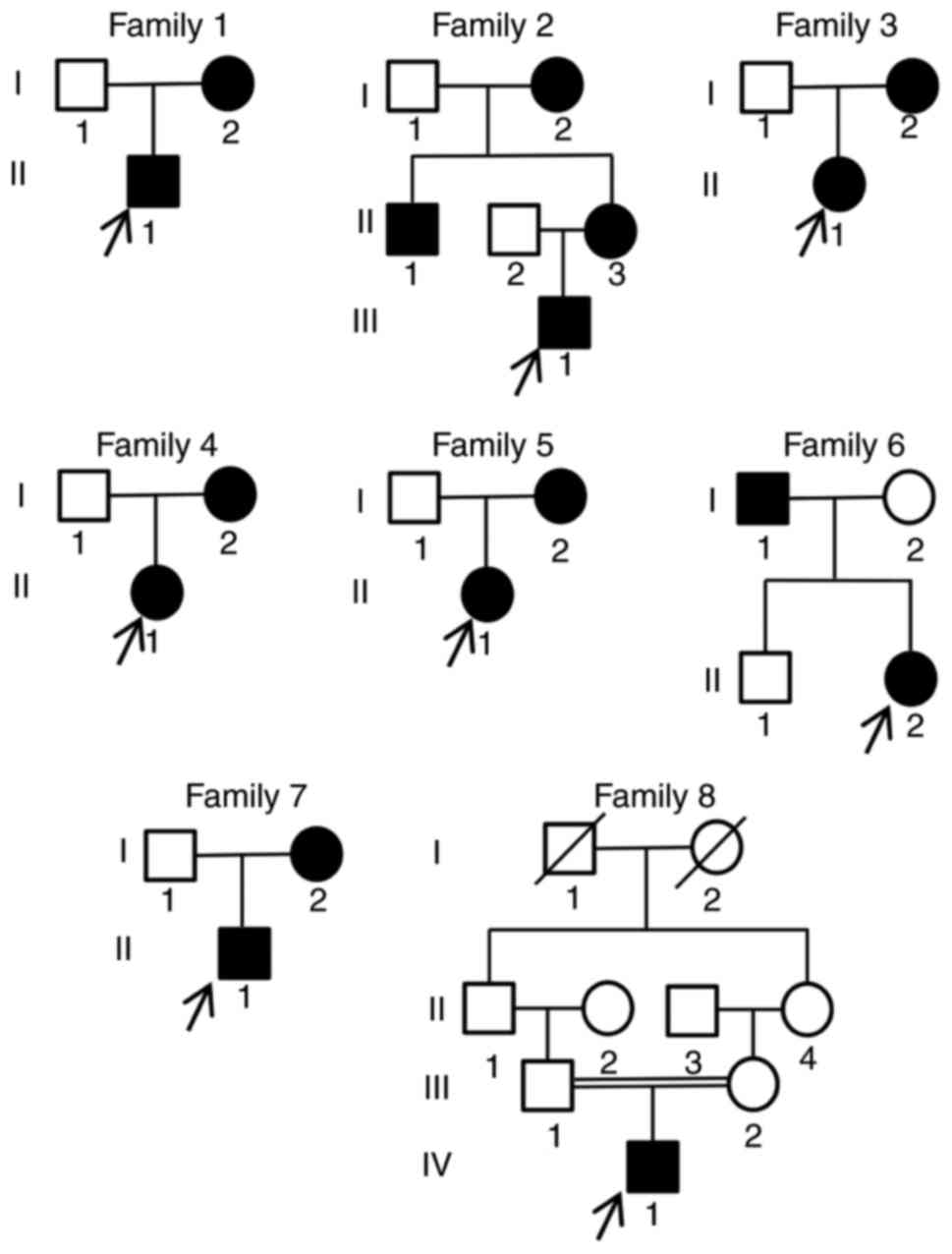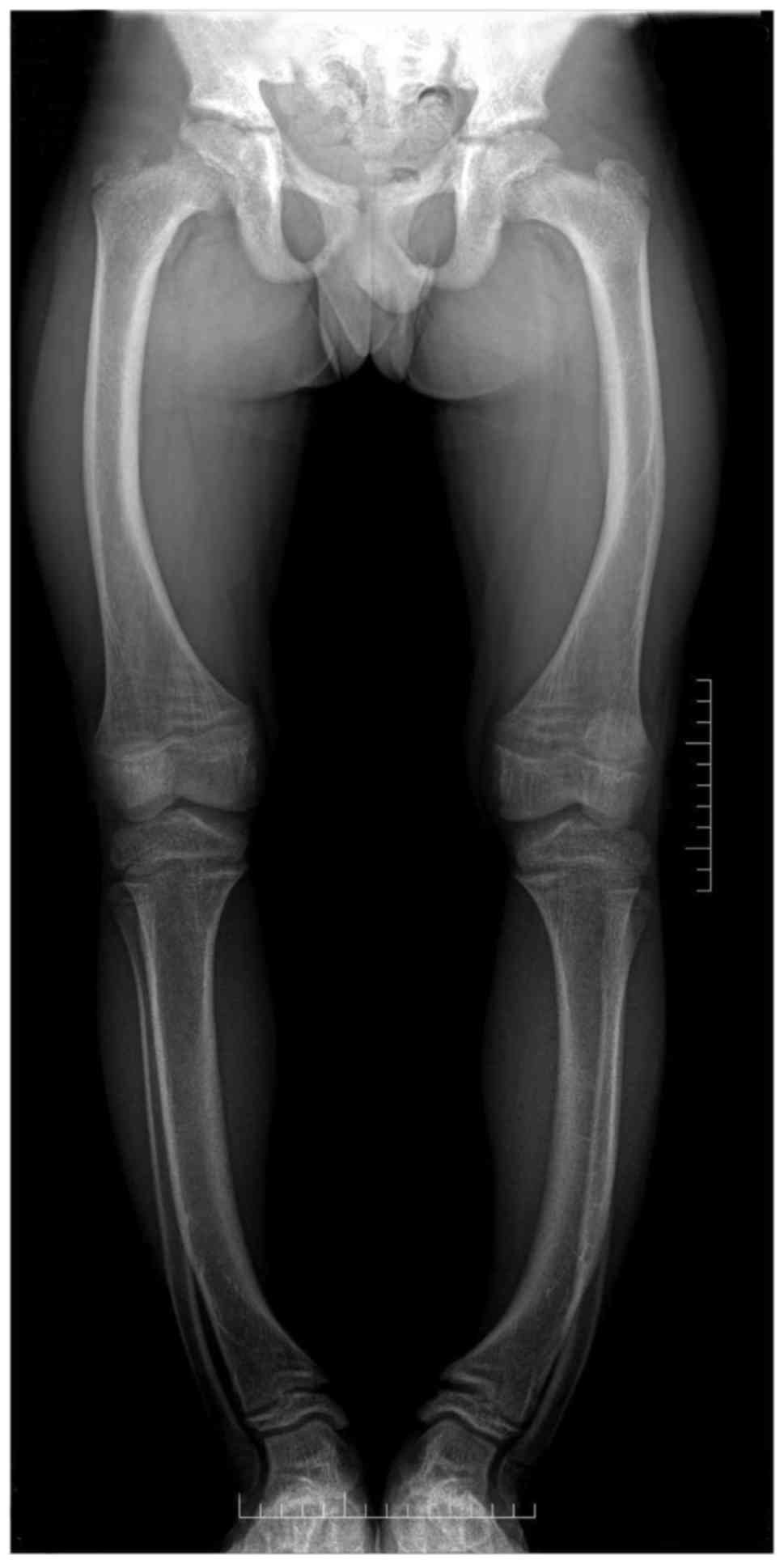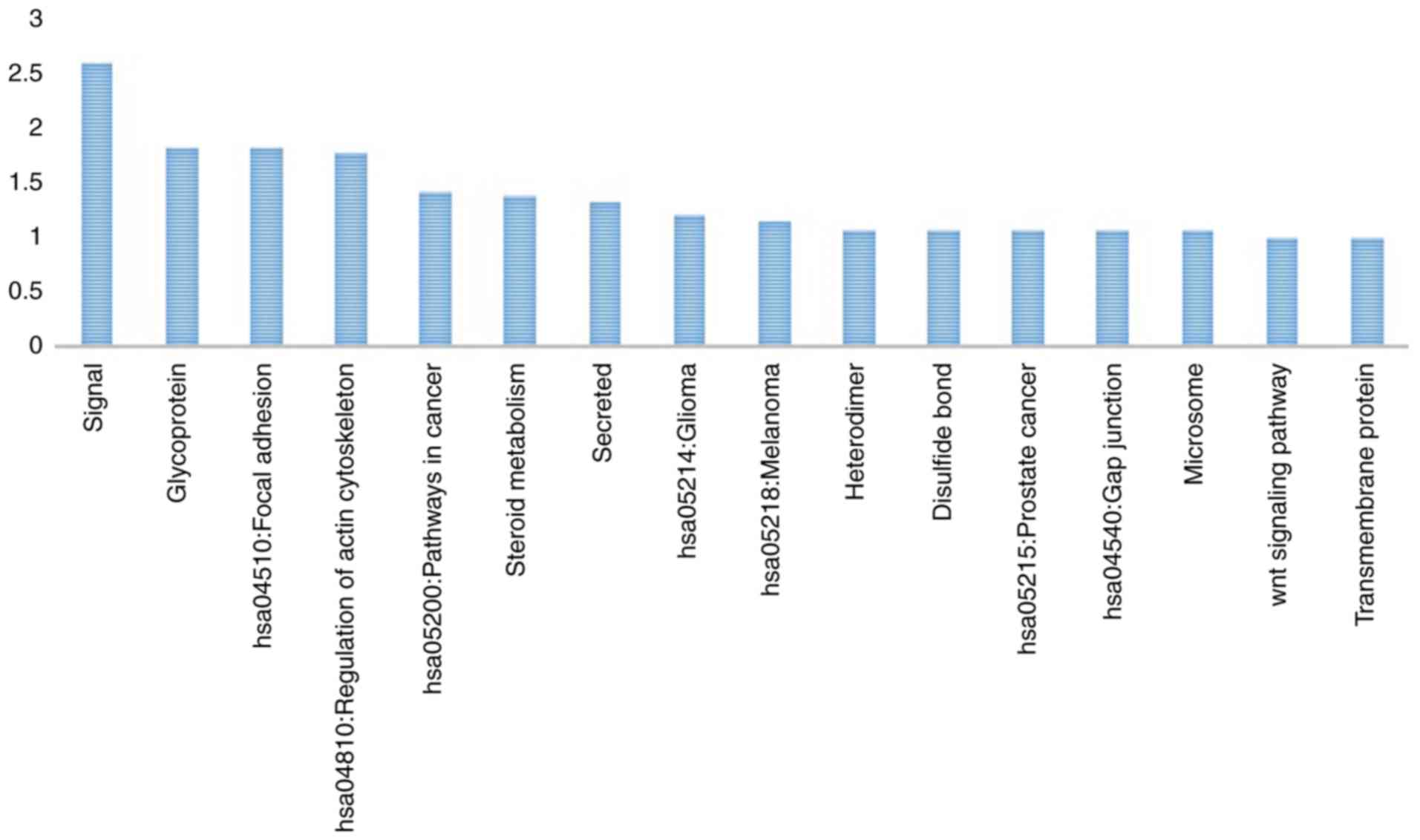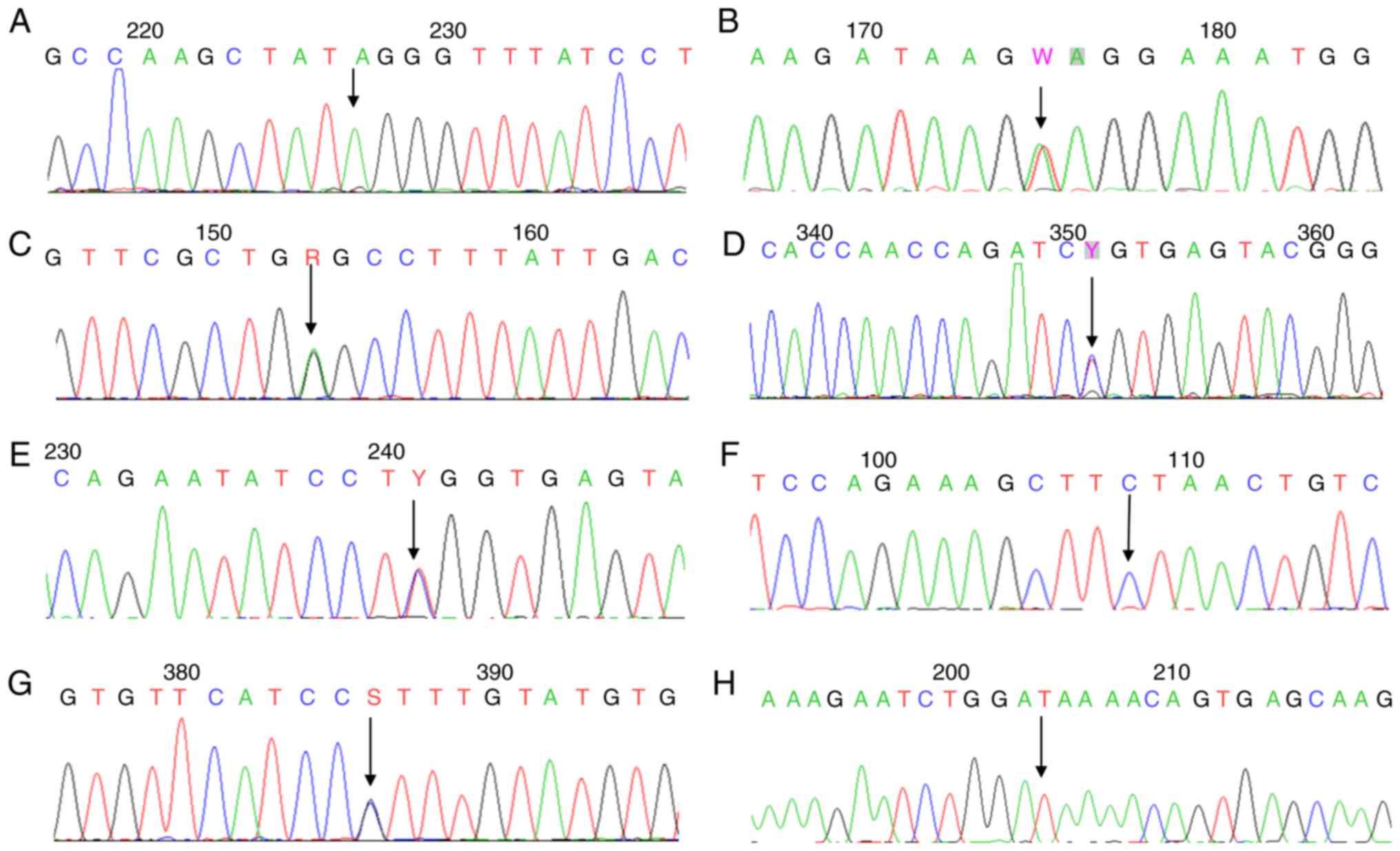|
1
|
Rajah J, Thandrayen K and Pettifor JM:
Clinical practice: Diagnostic approach to the rachitic child. Eur J
Pediatr. 170:1089–1096. 2011. View Article : Google Scholar : PubMed/NCBI
|
|
2
|
A gene (PEX) with homologies to
endopeptidases is mutated in patients with X-linked
hypophosphatemic rickets. The HYP Consortium Nat Genet. 11:130–136.
1995.
|
|
3
|
ADHR Consortium: Autosomal dominant
hypophosphataemic rickets is associated with mutations in FGF23.
Nat Genet. 26:345–348. 2000. View
Article : Google Scholar : PubMed/NCBI
|
|
4
|
Lorenz-Depiereux B, Bastepe M, Benet-Pagès
A, Amyere M, Wagenstaller J, Müller-Barth U, Badenhoop K, Kaiser
SM, Rittmaster RS, Shlossberg AH, et al: DMP1 mutations in
autosomal recessive hypophosphatemia implicate a bone matrix
protein in the regulation of phosphate homeostasis. Nat Genet.
38:1248–1250. 2006. View
Article : Google Scholar : PubMed/NCBI
|
|
5
|
Feng JQ, Ward LM, Liu S, Lu Y, Xie Y, Yuan
B, Yu X, Rauch F, Davis SI, Zhang S, et al: Loss of DMP1 causes
rickets and osteomalacia and identifies a role for osteocytes in
mineral metabolism. Nat Genet. 38:1310–1315. 2006. View Article : Google Scholar : PubMed/NCBI
|
|
6
|
Levy-Litan V, Hershkovitz E, Avizov L,
Leventhal N, Bercovich D, Chalifa-Caspi V, Manor E, Buriakovsky S,
Hadad Y, Goding J and Parvari R: Autosomal-recessive
hypophosphatemic rickets is associated with an inactivation
mutation in the ENPP1 gene. Am J Hum Genet. 86:273–278. 2010.
View Article : Google Scholar : PubMed/NCBI
|
|
7
|
Lorenz-Depiereux B, Schnabel D, Tiosano D,
Häusler G and Strom TM: Loss-of-function ENPP1 mutations cause both
generalized arterial calcification of infancy and
autosomal-recessive hypophosphatemic rickets. Am J Hum Genet.
86:267–272. 2010. View Article : Google Scholar : PubMed/NCBI
|
|
8
|
Rafaelsen SH, Raeder H, Fagerheim AK,
Knappskog P, Carpenter TO, Johansson S and Bjerknes R: Exome
sequencing reveals FAM20c mutations associated with fibroblast
growth factor 23-related hypophosphatemia, dental anomalies, and
ectopic calcification. J Bone Miner Res. 28:1378–1385. 2013.
View Article : Google Scholar : PubMed/NCBI
|
|
9
|
Bergwitz C, Roslin NM, Tieder M,
Loredo-Osti JC, Bastepe M, Abu-Zahra H, Frappier D, Burkett K,
Carpenter TO, Anderson D, et al: SLC34A3 mutations in patients with
hereditary hypophosphatemic rickets with hypercalciuria predict a
key role for the sodium-phosphate cotransporter NaPi-IIc in
maintaining phosphate homeostasis. Am J Hum Genet. 78:179–192.
2006. View
Article : Google Scholar :
|
|
10
|
Lorenz-Depiereux B, Benet-Pages A,
Eckstein G, Tenenbaum-Rakover Y, Wagenstaller J, Tiosano D,
Gershoni-Baruch R, Albers N, Lichtner P, Schnabel D, et al:
Hereditary hypophosphatemic rickets with hypercalciuria is caused
by mutations in the sodium-phosphate cotransporter gene SLC34A3. Am
J Hum Genet. 78:193–201. 2006. View
Article : Google Scholar :
|
|
11
|
Brakemeier S, Si H, Gollasch M, Höffler D,
Buhl M, Köhler R, Hoyer J and Eichler I: Dent's disease:
Identification of a novel mutation in the renal chloride channel
CLCN5. Clin Nephrol. 62:387–390. 2004. View
Article : Google Scholar : PubMed/NCBI
|
|
12
|
Cho HY, Lee BH, Choi HJ, Ha IS, Choi Y and
Cheong HI: Renal manifestations of dent disease and lowe syndrome.
Pediatr Nephrol. 23:243–249. 2008. View Article : Google Scholar
|
|
13
|
Dhir G, Li D, Hakonarson H and Levine MA:
Late-onset hereditary hypophosphatemic rickets with hypercalciuria
(HHRH) due to mutation of SLC34A3/NPT2c. Bone. 97:15–19. 2017.
View Article : Google Scholar :
|
|
14
|
Goljanek-Whysall K, Tridimas A, McCormick
R, Russell NJ, Sloman M, Sorani A, Fraser WD and Hannan FM:
Identification of a novel loss-of-function PHEX mutation,
Ala720Ser, in a sporadic case of adult-onset hypophosphatemic
osteomalacia. Bone. 106:30–34. 2018. View Article : Google Scholar
|
|
15
|
Harismendy O, Ng PC, Strausberg RL, Wang
X, Stockwell TB, Beeson KY, Schork NJ, Murray SS, Topol EJ, Levy S
and Frazer KA: Evaluation of next generation sequencing platforms
for population targeted sequencing studies. Genome Biol.
10:R322009. View Article : Google Scholar : PubMed/NCBI
|
|
16
|
Okou DT, Steinberg KM, Middle C, Cutler
DJ, Albert TJ and Zwick ME: Microarray-based genomic selection for
high-throughput resequencing. Nat Methods. 4:907–909. 2007.
View Article : Google Scholar : PubMed/NCBI
|
|
17
|
Ng SB, Turner EH, Robertson PD, Flygare
SD, Bigham AW, Lee C, Shaffer T, Wong M, Bhattacharjee A, Eichler
EE, et al: Targeted capture and massively parallel sequencing of 12
human exomes. Nature. 461:272–276. 2009. View Article : Google Scholar : PubMed/NCBI
|
|
18
|
Wang C, Zhang H, He JW, Gu JM, Hu WW, Hu
YQ, Li M, Liu YJ, Fu WZ, Yue H, et al: The virulence gene and
clinical phenotypes of osteopetrosis in the Chinese population: Six
novel mutations of the CLCN7 gene in twelve osteopetrosis families.
J Bone Miner Metab. 30:338–348. 2012. View Article : Google Scholar
|
|
19
|
Li SS, Gu JM, Yu WJ, He JW, Fu WZ and
Zhang ZL: Seven novel and six de novo PHEX gene mutations in
patients with hypophosphatemic rickets. Int J Mol Med.
38:1703–1714. 2016. View Article : Google Scholar : PubMed/NCBI
|
|
20
|
Grieff M, Mumm S, Waeltz P, Mazzarella R,
Whyte MP, Thakker RV and Schlessinger D: Expression and cloning of
the human X-linked hypophosphatemia gene cDNA. Biochem Biophys Res
Commun. 231:635–639. 1997. View Article : Google Scholar : PubMed/NCBI
|
|
21
|
Kang QL, Xu J, Zhang Z, He JW, Lu LS, Fu
WZ and Zhang ZL: Three novel PHEX gene mutations in four Chinese
families with X-linked dominant hypophosphatemic rickets. Biochem
Biophys Res Commun. 423:793–798. 2012. View Article : Google Scholar : PubMed/NCBI
|
|
22
|
Popowska E, Pronicka E, Sułek A,
Jurkiewicz D, Rowe P, Rowinska E and Krajewska-Walasek M: X-linked
hypophosphatemia in Polish patients. 1 Mutations in the PHEX gene.
J Appl Genet. 41:293–302. 2000.
|
|
23
|
Goji K, Ozaki K, Sadewa AH, Nishio H and
Matsuo M: Somatic and germline mosaicism for a mutation of the PHEX
gene can lead to genetic transmission of X-linked hypophosphatemic
rickets that mimics an autosomal dominant trait. J Clin Endocrinol
Metab. 91:365–370. 2006. View Article : Google Scholar
|
|
24
|
Fisher LW and Fedarko NS: Six genes
expressed in bones and teeth encode the current members of the
SIBLING family of proteins. Connect Tissue Res. 44(Suppl 1):
S33–S40. 2003. View Article : Google Scholar
|
|
25
|
Yue H, Yu JB, He JW, Zhang Z, Fu WZ, Zhang
H, Wang C, Hu WW, Gu JM, Hu YQ, et al: Identification of two novel
mutations in the PHEX gene in Chinese patients with
hypophosphatemic rickets/osteomalacia. PLoS One. 9:e978302014.
View Article : Google Scholar : PubMed/NCBI
|
|
26
|
Koshida R, Yamaguchi H, Yamasaki K,
Tsuchimochi W, Yonekawa T and Nakazato M: A novel nonsense mutation
in the DMP1 gene in a Japanese family with autosomal recessive
hypophosphatemic rickets. J Bone Miner Metab. 28:585–590. 2010.
View Article : Google Scholar : PubMed/NCBI
|
|
27
|
Palmer G, Zhao J, Bonjour J, Hofstetter W
and Caverzasio J: In vivo expression of transcripts encoding the
Glvr-1 phosphate transporter/retrovirus receptor during bone
development. Bone. 24:1–7. 1999. View Article : Google Scholar : PubMed/NCBI
|
|
28
|
Villa-Bellosta R, Levi M and Sorribas V:
Vascular smooth muscle cell calcification and SLC20 inorganic
phosphate transporters: Effects of PDGF, TNF-alpha, and Pi.
Pflugers Arch. 458:1151–1161. 2009. View Article : Google Scholar : PubMed/NCBI
|
|
29
|
Brownstein CA, Adler F, Nelson-Williams C,
Iijima J, Li P, Imura A, Nabeshima Y, Reyes-Mugica M, Carpenter TO
and Lifton RP: A translocation causing increased alpha-klotho level
results in hypophosphatemic rickets and hyperparathyroidism. Proc
Natl Acad Sci USA. 105:3455–3460. 2008. View Article : Google Scholar : PubMed/NCBI
|


















